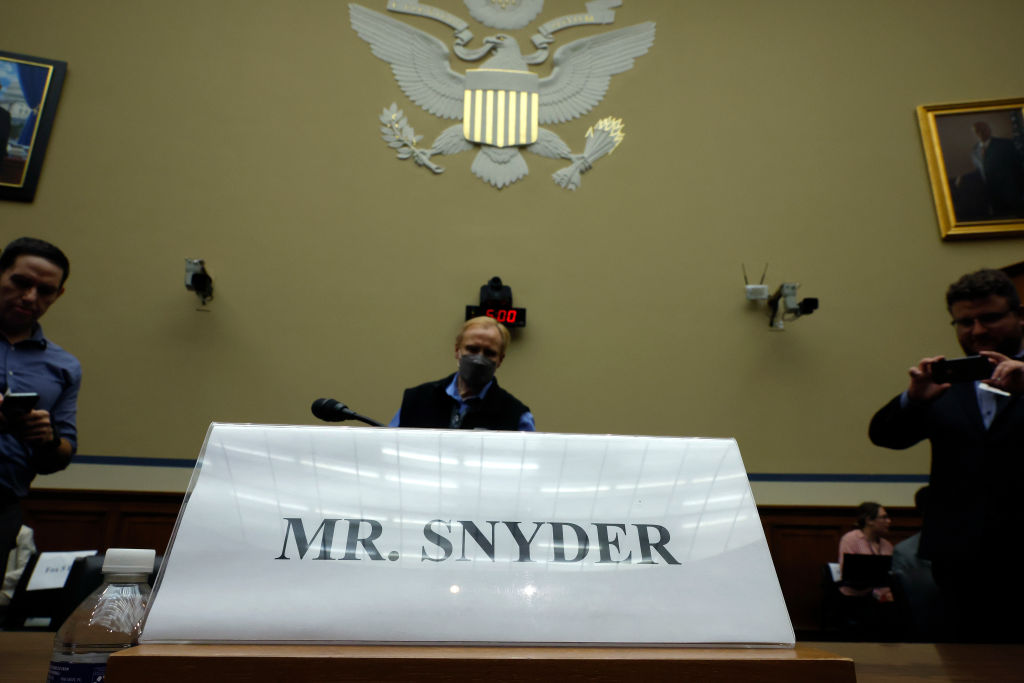To twist an old legal cliche, a motivated prosecutor could indict a ham sandwich if they wished. We’re about to find out if Dan Snyder is like a ham sandwich.
The Washington Post reported this week that Karl Racine, D.C.’s attorney general, is wrapping up what his office described as a year-long investigation of Dan Snyder and intends to “take further action” against the owner of the Washington Commanders.
The Racine story, though built around a summary of the fiscal malfeasances and sexual harassment allegations previously uncovered during investigations of the era's most aggressively awful sports owner by the Washington Post, ESPN, and even a Congressional committee, left some big questions unanswered. Such as: Why is the D.C. prosecutor looking into Snyder’s operation? And: What can he do with anything he finds?
According to the official website of the D.C. Office of Attorney General (OAG), Racine "enforces the District’s laws, works to protect and defend D.C. residents, and provides the highest level of independent legal advice and guidance to District of Columbia government agencies." It's not obvious how a Snyder inquiry fits into that job description. The team's offices are in Virginia, after all, and its games are played in Maryland.
A source within the OAG said Racine can investigate “anything that affects D.C. consumers, any business or entity that is having a negative impact on D.C residents.” The source did not provide any specifics about Racine’s potential actions against Snyder.
In response to the Post's story, which came a day before a scheduled NFL owners meeting in New York, the Commanders released a statement to Pro Football Talk calling threats of imminent legal action from Racine's office “unconscionable.” The statement also said “no one from [Racine’s] office has ever indicated that the office is planning to take any action against the team or Dan Snyder.”
The news that Racine was about to launch some a legal proceeding against Snyder set the table for Colts CEO Jim Irsay's face turn, highlighted by his cutting a Snyder-must-go promo at the owners summit.
Taken all together, it appears Racine is just the latest to sharpen his knives over Snyder. But the reality may be much less foreboding for the perpetually embattled owner. No matter how motivated Racine might be to take Snyder down, D.C.'s lack of statehood leaves the city's only elected prosecutor almost completely hamstrung when it comes to indicting either the owner or the cliched ham sandwich. The city's overlords in Congress, where D.C. residents have no voting representative, have decreed that Racine can only prosecute juveniles and a small number of non-juvenile misdemeanor offenders, such as somebody charged with traffic crimes, violations of the city's open-container law, or "possession of a B.B. gun." (Here's a list of the mostly small-time criminal cases that Congress allows Racine to pursue.)
Prosecutions of all felonies and more serious misdemeanors, meanwhile, are at the discretion of a federal appointee not accountable to voters in the city: Matthew Graves, the current U.S. Attorney for D.C.
Given the restrictions imposed by Congress back in 1973 with the passage of the Home Rule Act, the most powerful tools at Racine's disposal seem to be either filing civil litigation against Snyder—as he previously has against such no-goodniks as Donald Trump, Mark Zuckerberg and the Proud Boys—or, say, leaking vague proclamations about "taking further action" against him to a leading newspaper.
Racine isn't going after Snyder to get votes: He chose not to run for reelection, so he'll be out of office when his second term as attorney general expires on Jan. 2, 2023. A source within Racine's office said that any cases that Racine commences in his waning days on the job could be taken up by his successor. (That will in all likelihood be fellow Democrat Brian Schwalb, who won his party's primary for attorney general this summer and is running unopposed in D.C.'s Nov. 8 general election.)
Maybe the Washington Post story just means that Racine wanted to see his name in the newspaper's sports pages one more time before he leaves public office. Racine, 59, grew up in D.C. and was a schoolboy hoops star at St. John’s College High School, now a national sports powerhouse thanks to funding from alum and Under Armour founder Kevin Plank. As a senior there in 1981, Racine was named to the Post’s prestigious All-Met squad alongside Len Bias, Johnny Dawkins, and Adrian Branch, and played with Patrick Ewing and against Michael Jordan in that year’s Capital Classic high school all-star game. Racine then went to Penn and was on two Quaker teams that won Ivy League championships and played in the NCAA tournament. He came back to D.C. as a lawyer and served as White House counsel during President Bill Clinton’s impeachment.
He was sworn in as D.C.'s first elected attorney general in January 2015. Racine first let it be known he'd jumped on the Snyder pig pile in an April 2022 report also in the Washington Post. At the time, the owner was already the focus of a very public investigation on Capitol Hill by the House Committee on Oversight and Reform.
Much of the awfulness that was aired in the Congressional hearings had already appeared in Washington Post investigative pieces. There were allegations that Snyder’s operation systemically bilked fans by not refunding season ticket deposits, and lots of assertions that Snyder cultivated a workplace where sexual harassment of female employees went unchecked. But the heinous activity was typically blamed on Snyder’s underlings, not the big boss himself.
One exception: Tiffani Johnston, a former cheerleader and marketing manager for WFT, told Congress Snyder put his hand on her thigh under the table while they were at a business dinner, and also that Snyder tried to push her into his limo on the same night. Johnston did not say during her prepared remarks when the incident occurred or if it happened inside D.C. Johnston stopped working for the team in 2008.
But the city has a three-year statute of limitations on prosecuting misdemeanor sexual offenses. Regardless, sexual offenses and assault cases seem out of Racine's prosecutorial bailiwick. As for the financial shenanigans, most of the money offenses alleged so far in the hearings and other Snyder investigations took place around the turn of the century, shortly after he bought the team in 1999. The D.C. code sets a statute of limitations for criminal indictments in fraud cases of three years from the time of the offense. For civil lawsuits, there is also a three-year statute of limitations on fraud claims, though the clock in some cases only starts ticking after the victims are first made aware they’re victims. However, any fans who gave Snyder deposits for season tickets 20 years ago ostensibly knew at that time that they didn’t get tickets or refunds. So those cases would also seem to be out of Racine's reach.
Snyder, after months of avoiding Congress's invitations to testify and subpoenas by cruising the Mediterranean and watching IMAX flicks on his gazillion dollar yacht, gave the committee a reported 11-hour deposition under oath via the internet in late July. No transcripts or videos of Snyder’s appearance have yet been released. And despite D.C.’s reputation for having leaks bigger than the Titanic’s, no clips of the deposition have surfaced. Asked when the world will see Snyder's marathon Q&A, Nelly Decker, spokesperson for the Committee on Oversight and Reform staff, said via email, “[T]he Committee’s investigation is ongoing but that is all that I can share at this time.”
An OAG spokesperson declined to answer Defector's questions about whether Racine has had access to transcripts or video of Snyder being deposed after swearing to tell nothing but the truth. The spokesperson also declined to say whether Racine had the power to prosecute for perjury or any criminal case that might arise from the Congressional testimony.
Snyder's grip on his football franchise sure seems tenuous enough that if Racine's "further action" included a criminal indictment, lots of NFL owners would surely side with Irsay to take his team. Should Racine's much-hyped move end up being a mere civil suit, however, Snyder would likely be able to get off just by stroking a check.
So anybody who wants to get Snyder gone should work on getting D.C. statehood. Or hope Racine found proof of Snyder driving recklessly through town with an open beer and a B.B. gun.
Disclosure: Dan Snyder once sued the author for writing mean things about him.






